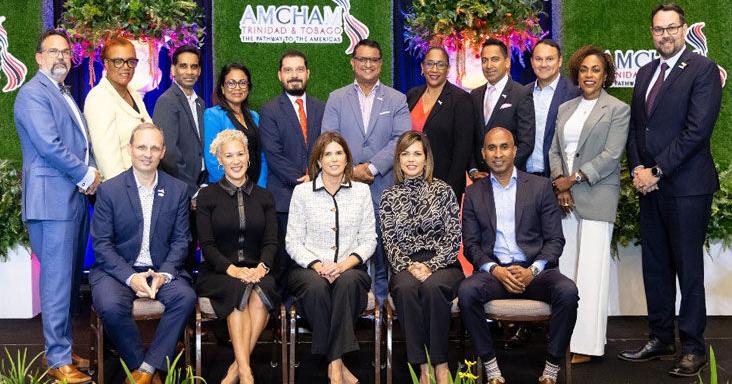By Vishanna Phagoo
Copyright trinidadexpress

The American Chamber of Commerce of Trinidad and Tobago (Amcham T&T) is urging the Government to take decisive action on ease of doing business, border security, crime reduction, and investment facilitation in the 2025/2026 budget presentation, warning that persistent inefficiencies and escalating crime continue to undermine competitiveness and deter investment.
In its budget recommendations issued Monday, Amcham outlined an agenda ranging from Customs modernisation and fiscal reform to migration policy and national security. While acknowledging incremental progress, the chamber stressed that bolder steps are urgently required to create a predictable, transparent, and investor-friendly business climate.
Amcham’s highest priority is urgent reform of the Customs and Excise Division. It called for shipment processing deadlines of 24–48 hours, removal of the online purchasing tax, describing it as a “nuisance tax with minimal impact on government revenue”, and full deployment of the ASYCUDA system.
“The express parcel industry is key to business competitiveness, as companies rely on timely imports and exports. Shipments should be processed within 24–48 hours, and Customs should be held accountable to this service standard. We recommend that a task force be established to oversee holistic Customs reform,” Amcham T&T said.
Amcham also recommended full automation and integration of Customs operations with TTBizLink, beginning with redesigned facilities and extended operating hours at Piarco International Airport before expansion to the seaports.
The chamber noted with concern that even shipments greenlit by ASYCUDA are subjected to 100% inspections, resulting in backlogs of five days or more. These delays, it said, increase costs for businesses, create storage challenges, and expose goods to damage.
To improve accountability, Amcham recommended creating an Internal Affairs and Professional Standards Bureau within Customs, similar to agencies in South Africa, Jamaica, the UK, and the US. It cited the World Customs Organisation’s Revised Arusha Declaration, which endorses internal monitoring to fight corruption.
The chamber also advocated for reinstating the 2011 procedure allowing commercial shipments under $20,000 to be cleared without an entry, and for adopting a US$400 de minimis threshold below which duties are not charged. It noted that these measures are already implemented in Jamaica, the Bahamas, Guyana, and French territories.
Renegotiation of the T&T-US
Double Taxation Treaty
Amcham also pressed for the renegotiation of the T&T-US Double Taxation Treaty, which has remained unchanged since 1971. The absence of relief from the US’s standard 30% withholding tax on dividends and interest puts T&T investors at a disadvantage compared to peers in Barbados and Jamaica, it warned.
The chamber also recommended implementing an Advance Tax Ruling System to provide clarity and predictability for complex tax issues. This would require regulations setting out published policies, binding timelines, and clear criteria for rulings.
It further urged reform of the value-added tax refund system, arguing that arbitrarily applying refunds to outstanding taxes undermines cash flow. Taxpayers, it said, should be given opportunities to respond before refunds are offset.
On compliance, Amcham proposed the use of GIS (Geographic Information System) mapping, AI-driven fraud detection, and cross-referencing with professional associations, coupled with a time-bound tax amnesty to allow businesses to regularise.
Turning to national security, Amcham warned that escalating crime remains the number one concern of its members and a major deterrent to investment.
“Addressing crime must remain a top priority for the Government. To rebuild trust, deter investment flight, and reduce business costs, we recommend the following priority actions,” it stated.
Among its proposals:
• Strengthening the Judiciary with turnaround targets for cases, digitised records, and independent performance reviews for court officers.
• Releasing remand inmates who have exceeded maximum sentence times.
• Making skills training—academic or vocational—mandatory for convicts.
Digital transformation
Amcham called for digital transformation of the T&T Police Service (TTPS), urging adoption of case-management software, laptops for officers, secure cloud storage, and cybersecurity protocols. It also emphasised the importance of community policing, with more investment in Police Youth Clubs and structured engagement programmes.
On forensic capability, the chamber pushed for a dedicated, internationally accredited DNA (deoxyribonucleic acid) laboratory, a centralised database, and greater international collaboration. It also highlighted the need to strengthen the Office of the Director of Public Prosecutions, the Fraud Squad, and the Financial Intelligence Unit.
To stimulate short- and medium-term growth, Amcham proposed creating a National Infrastructure Investment Fund (NIIF) to mobilise between US$500 million and US$1 billion in private capital for critical projects including ports, airports, toll roads, logistics hubs, affordable housing, and green infrastructure.
The fund should be governed transparently with private sector leadership and oversight from multilaterals such as the IDB and the World Bank, offering stable returns of 3-5% to investors through Government-backed guarantees.
Amcham also suggested a Progressive Economic Development Fund that would mobilise private capital through future tax credits, similar to existing allowances for arts, culture, and sports.
It recommended incentivising venture capital and private equity investment by allowing institutional investors to allocate small portions of their portfolios to such funds, and even allocating under 3% of the Heritage and Stabilisation Fund to private equity projects under strict criteria.
The chamber urged the Government to settle arrears owed to suppliers, warning that outstanding debts continue to constrain cash flow and limit tax contributions.
Amcham pushed for stronger policies to support innovation, including tax write-offs of up to 75% of working capital dedicated to research and development, capped at 2% of annual revenue.
It called for a deliberate nearshoring strategy to position T&T as a hub for IT-enabled services, AI, robotics process automation, and cybersecurity, driven by a national task force with measurable targets and a five-year mandate.
“The National Export Strategy should focus on quality of the labour pool rather than quantity,” Amcham argued, stressing the need to move into higher-value outsourcing segments such as legal services, business analytics, and clinical research.
The chamber said technology parks should be reoriented to foster start-ups in health, pharma, IT consulting, and R&D, supported by strong human capital investment.
Amcham flagged demographic challenges, noting that T&T’s birth rate has remained below replacement level since 1995, while the labour force participation rate has fallen. It recommended a comprehensive migration policy to balance economic migration, refugee management, and integration.
“Population growth would increase the availability of labour and strengthen the National Insurance System by expanding the contribution base,” it said.
Amcham also urged prioritisation of the National Statistical Institute (NSI), warning that deficiencies in data collection and reporting have been flagged by credit rating agencies.
“Accurate, relevant, and real-time data is essential not only for government planning but also for business decisions. The transition to the NSI is therefore a critical component of effective planning for the future,” it stated.
While calling for reform in several areas, Amcham commended Government progress on the National Digital Transformation Strategy. It urged acceleration to align with global best practices and position T&T as a digital leader.
Amcham T&T’s priority
recommendations include:
• Finalising a National Digital Economy Strategy targeting high-value sectors such as software development, cybersecurity, precision agriculture, and creative media.
• Legislating the “Once-Only” Principle to allow secure cross-ministry data exchange and reduce administrative burdens.
• Introducing a Digital Nomad Visa to attract remote workers, boost foreign exchange, and support tourism.
• Establishing a multi-stakeholder Accountability Council to track digital progress through annual scorecards.
• Developing a Cloud Computing Policy and conducting a national data audit to strengthen governance.
• Relaunching the open data platform (data.tt) with expanded datasets and public-private collaboration.
• Establishing innovation centres in areas such as cybersecurity, renewable energy, and digital media.
• Implementing a National ICT Training Framework and ten-year workforce plan to close digital skills gaps.
• Extending TTBizLink’s functionality to include tax filing, licensing, and regulatory sandboxes for SMEs.
• Updating laws to enable e-services, e-payments, and ICT infrastructure rollout, including a “Dig Once” policy.
• Creating regulatory sandboxes for AI, smart city, and IoT solutions under consumer protection safeguards.
• Adopting International Public Sector Accounting Standards (IPSAS) to strengthen fiscal transparency and data-driven budgeting.
On the ESG front, Amcham pressed for tax credits for renewable energy, feed-in tariffs, and incentives for green building. It also recommended stronger enforcement of environmental penalties, social investment tax breaks, and an ESG dashboard to track Government progress.
“Our recommendations reflect the voice of the business community and are designed to align with national goals of diversification, digital modernisation, safety, and global competitiveness,” Amcham stated. “We stand ready to support the Government through collaboration, technical assistance, and sustained advocacy to ensure that the policies of today result in measurable and equitable improvements for all citizens tomorrow.”



